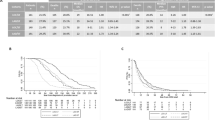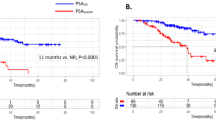Abstract
Background
The objective of this study was to evaluate the prognostic value of early PSA decline following initiation of second-generation hormone therapy (2nd HT), namely abiraterone acetate or enzalutamide, in patients with taxane-refractory metastatic castrate-resistant prostate cancer (mCRPC) and evaluate utility of this metric in informing intensified surveillance/imaging protocols.
Methods
We retrospectively identified 75 mCRPC patients treated with 2nd HT following docetaxel failure (defined as PSA rise and radiographic progression). Patients were categorized patients into two cohorts based on the first PSA within 3 months after initiation of therapy: PSA reduction ≥50% (Group A) and PSA reduction <50% (Group B). The primary endpoint was cancer-specific mortality (CSM). The secondary endpoint was radiographic disease progression (rDP) on 2nd HT. In univariate and multivariate analyses, we investigated factors associated with rPD and CSM.
Results
We included 75 patients (52 in Group A, 23 in Group B) in the analytic cohort. Baseline clinico-demographic characteristics, including median age, primary Gleason score risk group, median pre-treatment PSA, disease burden, site of metastases, and pre-treatment ECOG score were not statistically different between the two groups. Median follow up time was 30 months and the median time to radiographic disease progression was 28.1 and 12.5 months (p = 0.002) in cohorts A and B, respectively. On univariate and multivariate analyses, both PSA reduction ≥50% and volume of metastatic disease were significantly associated with a decreased risk of radiographic disease progression (HR 0.41, 95% CI 0.21–0.80, p = 0.0113) as well as a decreased risk of cancer-specific mortality (HR 0.29, 95% CI 0.09–0.87, p = 0.0325).
Conclusion
PSA reduction ≥50% within 3 months of starting 2nd HT was associated with significantly improved radiographic disease progression-free survival and 3-year cancer-specific mortality. This suggests using PSA 50%-decline metric in surveillance patients with on 2nd HT and identifies patients who require further evaluation with imaging.
This is a preview of subscription content, access via your institution
Access options
Subscribe to this journal
Receive 4 print issues and online access
We are sorry, but there is no personal subscription option available for your country.
Buy this article
- Purchase on Springer Link
- Instant access to full article PDF
Prices may be subject to local taxes which are calculated during checkout


Similar content being viewed by others
Data availability
The authors affirm that the data substantiating the conclusions of this study can be found within the article itself, including its figures and tables. In addition, the raw data underpinning the study’s results is accessible from the corresponding author in an anonymized format upon reasonable request for the purpose of review.
References
Baciarello G, Gizzi M, Fizazi K. Advancing therapies in metastatic castration-resistant prostate cancer. Expert Opin Pharmacother. 2018;19:1797–804.
Khoshkar Y, Westerberg M, Adolfsson J, Bill-Axelson A, Olsson H, Eklund M, et al. Mortality in men with castration-resistant prostate cancer-A long-term follow-up of a population-based real-world cohort. BJUI Compass. 2022;3:173–83.
Denmeade SR, Isaacs JT. A history of prostate cancer treatment. Nat Rev Cancer. 2002;2:389–96.
Ingrosso G, Detti B, Scartoni D, Lancia A, Giacomelli I, Baki M, et al. Current therapeutic options in metastatic castration-resistant prostate cancer. Semin Oncol. 2018;45:303–15.
FDA approves pluvicto/locametz for metastatic castration-resistant prostate cancer. J Nucl Med. 2022;63:13N.
James ND, Sydes MR, Clarke NW, Mason MD, Dearnaley DP, Spears MR, et al. Addition of docetaxel, zoledronic acid, or both to first-line long-term hormone therapy in prostate cancer (STAMPEDE): survival results from an adaptive, multiarm, multistage, platform randomised controlled trial. Lancet. 2016;387:1163–77.
Sweeney CJ, Chen YH, Carducci M, Liu G, Jarrard DF, Eisenberger M, et al. Chemohormonal therapy in metastatic hormone-sensitive prostate cancer. N Engl J Med. 2015;373:737–46.
Vale CL, Burdett S, Rydzewska LHM, Albiges L, Clarke NW, Fisher D, et al. Addition of docetaxel or bisphosphonates to standard of care in men with localised or metastatic, hormone-sensitive prostate cancer: a systematic review and meta-analyses of aggregate data. Lancet Oncol. 2016;17:243–56.
Andrews JR, Ahmed ME, Karnes RJ, Kwon E, Bryce AH. Systemic treatment for metastatic castrate resistant prostate cancer: does seqence matter? Prostate. 2020;80:399–406.
O’Neill AJ, Prencipe M, Dowling C, Fan Y, Mulrane L, Gallagher WM, et al. Characterisation and manipulation of docetaxel resistant prostate cancer cell lines. Mol Cancer. 2011;10:126.
Beer TM, Armstrong AJ, Rathkopf D, Loriot Y, Sternberg CN, Higano CS, et al. Enzalutamide in men with chemotherapy-naive metastatic castration-resistant prostate cancer: extended analysis of the phase 3 PREVAIL study. Eur Urol. 2017;71:151–4.
Scher HI, Fizazi K, Saad F, Taplin ME, Sternberg CN, Miller K, et al. Increased survival with enzalutamide in prostate cancer after chemotherapy. N Engl J Med. 2012;367:1187–97.
de Bono JS, Logothetis CJ, Molina A, Fizazi K, North S, Chu L, et al. Abiraterone and increased survival in metastatic prostate cancer. N Engl J Med. 2011;364:1995–2005.
Bryce AH, Alumkal JJ, Armstrong A, Higano CS, Iversen P, Sternberg CN, et al. Radiographic progression with nonrising PSA in metastatic castration-resistant prostate cancer: post hoc analysis of PREVAIL. Prostate Cancer Prostatic Dis. 2017;20:221–7.
Facchini G, Caffo O, Ortega C, D’Aniello C, Di Napoli M, Cecere SC, et al. Very early PSA response to abiraterone in mCRPC patients: a novel prognostic factor predicting overall survival. Front Pharm. 2016;7:123.
Rescigno P, Lorente D, Bianchini D, Ferraldeschi R, Kolinsky MP, Sideris S, et al. Prostate-specific antigen decline after 4 weeks of treatment with abiraterone acetate and overall survival in patients with metastatic castration-resistant prostate cancer. Eur Urol. 2016;70:724–31.
Schiff JP, Cotogno P, Feibus A, Steinwald P, Ledet E, Lewis B, et al. Early prostate-specific antigen response post-abiraterone as predictor of overall survival in metastatic castrate-resistant prostate cancer. BMC Cancer. 2019;19:524.
Alumkal JJ, Sun D, Lu E, Beer TM, Thomas GV, Latour E, et al. Transcriptional profiling identifies an androgen receptor activity-low, stemness program associated with enzalutamide resistance. Proc Natl Acad Sci USA. 2020;117:12315–23.
Verzoni E, De Giorgi U, Derosa L, Caffo O, Boccardo F, Facchini G, et al. Predictors of long-term response to abiraterone in patients with metastastic castration-resistant prostate cancer: a retrospective cohort study. Oncotarget. 2016;7:40085–94.
Chang LW, Hung SC, Wang SS, Li JR, Yang CK, Chen CS, et al. Abiraterone acetate and enzalutamide: similar efficacy in treating post docetaxel metastatic castration-resistant prostate cancer: single center experience. Anticancer Res. 2019;39:3901–8.
Armstrong AJ, Lin P, Higano CS, Iversen P, Sternberg CN, Tombal B, et al. Prognostic association of prostate-specific antigen decline with clinical outcomes in men with metastatic castration-resistant prostate cancer treated with enzalutamide in a randomized clinical trial. Eur Urol Oncol. 2019;2:677–84.
Alamiri J, Britton CJ, Ahmed ME, Andrews JR, Higa JL, Dundar A, et al. Radiographic paradoxical response in metastatic castrate-resistant prostate cancer (mCRPC) managed with new generation anti-androgens: a retrospective analysis. Prostate. 2022;82:1483–90.
Ueda Y, Matsubara N, Tabata KI, Satoh T, Kamiya N, Suzuki H, et al. Prostate-specific antigen flare phenomenon induced by abiraterone acetate in chemotherapy-naive patients with metastatic castration-resistant prostate cancer. Clin Genitourin Cancer. 2017;15:320–5.
Author information
Authors and Affiliations
Contributions
Conceptualization, MEA; writing—original draft preparation, MEA, and MSL; writing—review and editing, AMM, AG, RB, ATK, DSC, and MSB; data collection: RH; statistical analysis: MEA; supervision, AHB, RJK, EDK, and JRA. All authors have read and agreed to the published version of the manuscript.
Corresponding author
Ethics declarations
Competing interests
The authors declare no competing interests.
Additional information
Publisher’s note Springer Nature remains neutral with regard to jurisdictional claims in published maps and institutional affiliations.
Rights and permissions
Springer Nature or its licensor (e.g. a society or other partner) holds exclusive rights to this article under a publishing agreement with the author(s) or other rightsholder(s); author self-archiving of the accepted manuscript version of this article is solely governed by the terms of such publishing agreement and applicable law.
About this article
Cite this article
Ahmed, M.E., Lee, M.S., Mahmoud, A.M. et al. Early PSA decline after starting second-generation hormone therapy in the post-docetaxel setting predicts cancer-specific survival in metastatic castrate-resistant prostate cancer. Prostate Cancer Prostatic Dis (2023). https://doi.org/10.1038/s41391-023-00751-6
Received:
Revised:
Accepted:
Published:
DOI: https://doi.org/10.1038/s41391-023-00751-6



